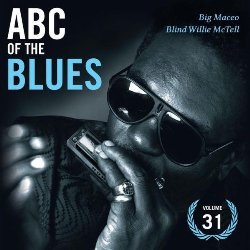ABC Of The Blues CD31 (2010)
ABC of the Blues CD31 (2010)

CD31 - Big Maceo & Blind Wille McTell 31-01 Big Maceo – Worried Life Blues 31-02 Big Maceo – County Jail Blues 31-03 Big Maceo – Can’t You Read 31-04 Big Maceo – Tuff Luck Blues 31-05 Big Maceo – It’s All Up to You 31-06 Big Maceo – Poor Kelly Blues 31-07 Big Maceo – My Last Go Round 31-08 Big Maceo – I Got the Blues play 31-09 Big Maceo – Ramblin’ Mind Blues 31-10 Big Maceo – Why Should I Hang Around 31-11 Blind Willie McTell – Georgia Rag 31-12 Blind Willie McTell – Rough Alley Blues 31-13 Blind Willie McTell – Low Rider’s Blues 31-14 Blind Willie McTell – Painful Blues play 31-15 Blind Willie McTell – Experience Blues 31-16 Blind Willie McTell – Low Down Blues 31-17 Blind Willie McTell – Lonesome Day Blues 31-18 Blind Willie McTell – Mama, Let Me Scoop for You 31-19 Blind Willie McTell – Rollin’ Mama Blues 31-20 Blind Willie McTell – Searching the Desert for the Blues
Big Maceo Merriweather (March 31, 1905 – February 23, 1953) was an American Chicago blues pianist and singer, active in Chicago in the 1940s.
Born Major Merriweather (or Merewether) in Atlanta, Georgia, United States, he was a self-taught pianist. In the 1920s he moved to Detroit, Michigan and began playing parties and clubs. In 1941, a desire to record led him to Chicago where he met and befriended Tampa Red. Red introduced him to Lester Melrose of Bluebird Records, who signed him to a recording contract.
His first record was "Worried Life Blues" (1941), which promptly became a blues hit and remained his signature piece. Other classic piano blues recordings such as "Chicago Breakdown", "Texas Stomp", and "Detroit Jump" followed. His piano style developed from players like Leroy Carr and Roosevelt Sykes, as well as from the Boogie-woogie style of Meade Lux Lewis and Albert Ammons. He in turn influenced other musicians like Henry Gray, who credits Merriweather to helping him launch his career as a blues pianist.
His style had an impact on practically every post World War II blues pianist of note. His most famous song, "Worried Life Blues" is a staple of the blues repertoire, with artists such as Eric Clapton featuring it regularly in concert. "Worried Life Blues" was in the first batch of songs inducted into the Blues Hall of Fame "Classic Blues Recordings - Singles or Albums Tracks" alongside "Stormy Monday," 'Sweet Home Chicago," "Dust My Broom," and "Hellhound On My Trail."
His career was cut short in 1946 by a stroke. Poor health and a lifetime of heavy drinking eventually led to a fatal heart attack. He died on February 23, 1953 in Chicago.
His sparse recordings for Bluebird were released in a double album set as Chicago Breakdown, in 1975. They have since been reissued on a variety of labels. In 2002 he was posthumously inducted into the Blues Hall of Fame.
Blind Willie McTell (born William Samuel McTier, May 5, 1898 – August 19, 1959), was an influential Piedmont and ragtime blues singer and guitarist. He played with a fluid, syncopated fingerstyle guitar technique, common among many exponents of Piedmont blues, although, unlike his contemporaries, he used exclusively a twelve-string guitar. As well as this, McTell was an adept slide guitarist, unusual among many ragtime bluesmen. His vocal style, a smooth and often laid-back tenor, differed greatly from many of the harsher and more expressive voice types employed by Delta bluesmen such as Charlie Patton. McTell embodied a variety of musical styles, including blues, ragtime, religious music, and hokum.
Born blind in the town of Thomson, Georgia, McTell learned how to play the guitar during his teens. He soon became a street performer around several Georgia cities, namely Atlanta; and first recorded in 1927 for Victor Records. Although he never produced a major hit record, McTell's recording career was prolific, recording for different labels under different names all throughout the 1920s and 30s, often with other people. In 1940, he was recorded by John Lomax for the Library of Congress's folk song archive. He would remain active throughout the 1940s and 50s, playing on the streets of Atlanta, often with his longtime partner Curley Weaver. Twice more he recorded professionally. McTell's last recordings originated during an impromptu session recorded by Atlanta record store owner Edward Rhodes in 1956; these were released posthumously. McTell would die three years later after suffering for years from diabetes and alcoholism. Despite his mainly failed releases, McTell was one of the few archaic blues musicians that would live to actively play and record during the 1940s and 50s (although, McTell never lived to be "rediscovered" during the imminent American folk music revival, where many other bluesmen would be rediscovered and given a chance to record).
McTell's influence extended over a wide variety of artists, including The Allman Brothers Band, who famously covered McTell's "Statesboro Blues", and Bob Dylan, who paid tribute to McTell in his 1983 song "Blind Willie McTell". Other artists include Taj Mahal, Alvin Youngblood Hart, The White Stripes, and Chris Smither.
download (mp3 @320 kbs):
yandex 4shared mediafire ulozto gett bayfiles
Last Updated (Tuesday, 20 August 2019 19:48)








